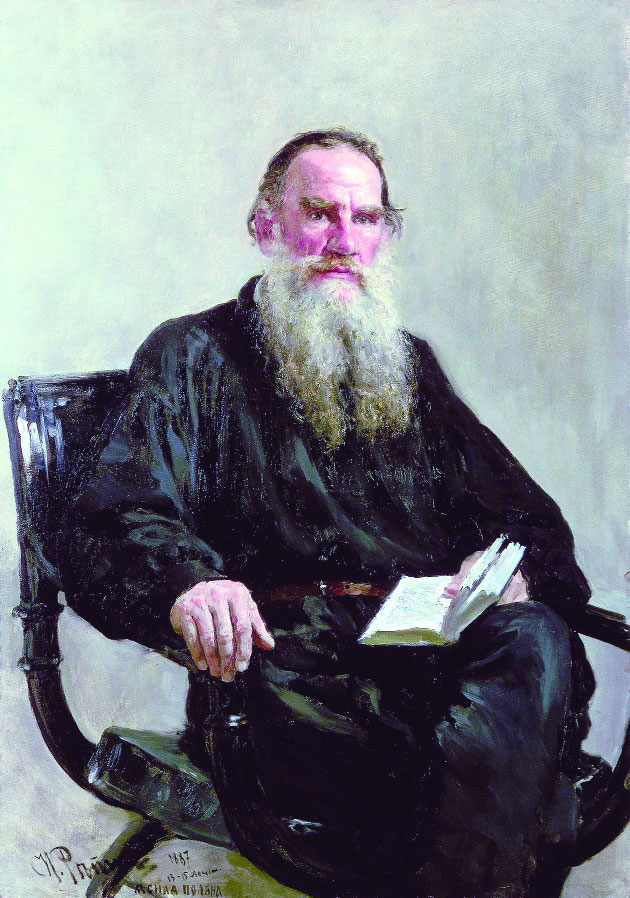Though Leo Tolstoy and Gandhiji never crossed each other’s path, their shared values and understanding have helped India and Russia bridge gaps
Leo Tolstoy (September 9, 1828-November 20, 1910) is an all-time genius to the entire literary world, cutting across all borders. At the same time, it is worth remembering that for Mahatma Gandhi (October 2, 1869-January 30, 1948) our Father of Nation, distinctly more than above, Tolstoy remained his spiritual guru. A moral philosopher, and one of the greatest authors of all time, he was noted for his non-violent resistance through his work, The Kingdom of God is Within You.
No doubt, Gandhiji was profoundly inspired and influenced by Tolstoy. The two giants never met personally in their life-time but both were close in their hearts and minds. Outstanding Russian writer-philosopher and social activist, Tolstoy was a major influence in the major development of Christian anarchism and pacifism, non-violent resistance movements, such as those of Mahatma Gandhi, Martin Luther King and political strategies of Nelson Mandela. Tolstoy’s place in India’s socio-political, cultural, historical context is unique and significant. The imposing monument of Leo Tolstoy, installed in the premises of the State Trading Corporation building in the national Capital on Tolstoy Marg, the road named after him, is a clear manifestation of the profound reverence the people of India showered on him.
Only the other day, floral tributes were paid to the great Russian writer under the auspices of the Russian Centre of Science and Culture, New Delhi, which was followed by a photo exhibition, showing different facets of the writer’s life and career at its premises while celebrating his 190th birth anniversary.
With due recognition and exalted honour given to great masters of Russian literature, such as Maxim Gorky, Alexander Pushkin, Vladimir Mayakovsky, Fyodor Dostoevsky, Anton Chekhov, Nikolai Gogol, Ivan Turgenev, and others, it is to be borne in mind that, in real fact, Tolstoy distinguishes himself in precise, perfect and flaw-less humaneness, social justice and moral philosophy in his writings. His widely acclaimed works, such as The Kingdom of God is Within You, Anna Karenina, War and Peace, The Resurrection and The Death of Ivan Ilych, to name a few, are some his masterpieces, creating vibrant impact on readers across the world.
His craftsmanship as a writer, as also his creativity and imagination, still shines in the brilliance of some of his formulations. This writer once requested the Oxford-returned English professor during his college days to suggest some noted classics to improve the language. He, without a second thought, leaving aside Western classics, mentioned Anna Karenina, asking the writer thereon to read it over and over again.
Though I could not grasp much on my first reading, repeated reading in my later life proved how strong is the moral that the novel conveys, and which is still haunting my memory. Gandhiji was deeply moved by Tolstoy’s book, The Kingdom of God is Within You, which he read on October 1, 1904, during a train journey from Johannesburg to Durban in South Africa.
The Mahatma stated in his autobiography that the book changed his life. Soon after reading the book, he changed his way of life by establishing the Phoenix settlement. Here, he and his co-workers, practised many of his ideals put forth by Ruskin. Gandhiji was so deeply impressed with the book that he wrote a letter to Tolstoy on October 1, 1909, and maintained correspondence with him thereafter.
He wrote in his autobiography that this book made a deeper impression on him, and opened his vision to the infinite possibilities of universal love. The correspondence between Tolstoy and Gandhiji became epoch-making in the golden chapter of Indo-Russian relations.
Tolstoy took care to make a unique blend of Indian works and motifs, which was effectively understood and assimilated by Russian readers. He carefully adopted Indian fables and fairy tales to the Russian perception and sensibilities. The Tolstoy Farm (1910-1913), Gandhiji established near Johannesburg, South Africa, was an ideal laboratory for Gandhiji’s educational experiments.
The literary enlightenment, coupled with the philosophic and spiritual emancipation, exemplified by Leo Tolstoy was also eloquently expressed by Jawaharlal Nehru, who in one of his memorable letters written from a jail to his daughter, Indira Gandhi in 1930 said: “Leo Tolstoy is perhaps the greatest of them all...not only a genius at writing novels, but also a religious and spiritual leader, whose influence was far-reaching”.
(The writer is media advisor, Russian Centre of Science and Culture, New Delhi)


























